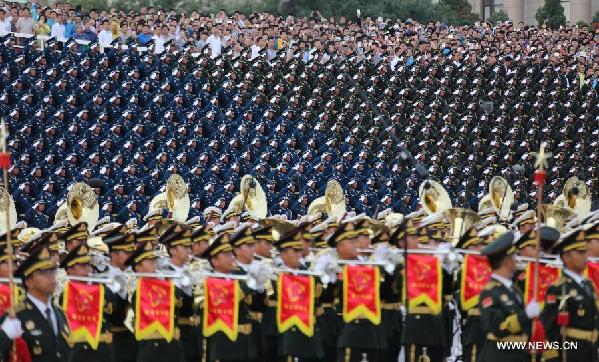China has every reason to celebrate victory
- By Wang Yiwei
 0 Comment(s)
0 Comment(s) Print
Print E-mail China Daily, August 24, 2015
E-mail China Daily, August 24, 2015
 |
|
The military band of the Chinese People's Liberation Army takes part in a rehearsal for a military parade in Beijing, capital of China, Aug. 23, 2015. China will hold a grand military parade on Sept. 3 to mark the 70th anniversary of the victory of the Chinese People's War of Resistance Against Japanese Aggressions and the World Anti-Fascist War. (Xinhua/Li Gang) |
Republic of Korea President Park Geun-hye will pay a three-day visit to China from Sept 2 to attend the celebrations in Beijing to mark the 70th anniversary of the end of World War II. On Sept 4, she is scheduled to visit Shanghai to re-open the office of the Provisional Government of the Republic of Korea, which was set up by some Korean independence fighters in 1919, nine years after Japan occupied the Korean Peninsula.
But the commemorative activities in China, along with the Victory Day parade in Moscow about three months ago, have been used to speculate that China and Russia are forging an "anti-West alliance". Skeptics even cite the ongoing China-Russia naval drills in the Peter the Great Gulf and other areas off the Russian coast as "solid evidence" of the building up of such an alliance.
Worse, a recent editorial in the London-based Economist magazine said China's Sept 3 parade "is not just about remembrance"; it will "unsettle" its neighbors, as the country "plays up themes of historical victimhood and the need to correct" them.
The truth is, China's contribution to the victory in the anti-fascist war has been underestimated both at home and abroad. The Chinese People's War of Resistance Against Japanese Aggression (1937-45) actually started with the Sept 18th Incident in 1931 and lasted almost 14 years - the first and the longest fight against fascist forces.
The sacrifices of the Chinese people (35 million casualties) during that bloody period, too, deserve full acknowledgement. China lost more people, both soldiers and civilians, than any other country, except perhaps for the Soviet Union (at least 27 million), in the anti-fascist war. The Chinese people engaged a huge number of Japanese troops in battles in China, where nearly 70 percent of Japanese troops were injured or killed.






Go to Forum >>0 Comment(s)